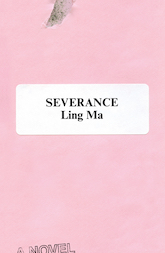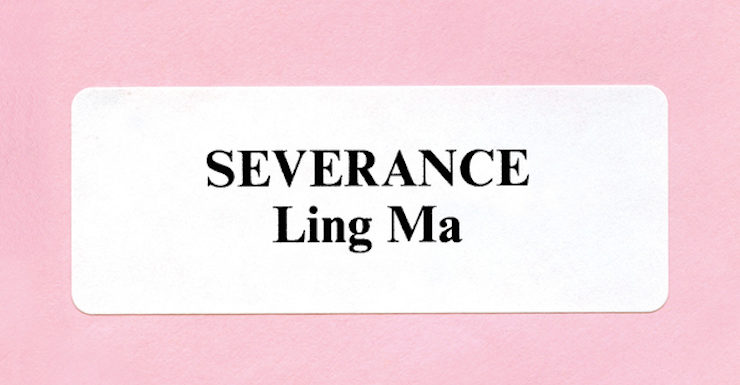So frequently, stories set after a catastrophic event that disrupts or destroys society concern themselves with a re-establishment of the status quo. It might be in rebuilding that which came before; it might come through the quest for some lost home, in the slim hope that some sliver of the past might be preserved. In those stories, nostalgia in the face of terror may be the only thing that keeps humanity alive.
Ling Ma’s Severance is not one of those stories. It’s a novel that sneaks up on you from all sides: it’s an affecting portrayal of loss, a precise fictional evocation of group dynamics, and a sharp character study of its protagonist, Candace Chen. It also features one of the most hauntingly plausible end-of-the-world scenarios I’ve encountered in recent fiction, one which folds in enough hints of the real to be particularly unsettling. “The End begins before you are ever aware of it,” Candace observes early in the novel, and much of Severance’s power arrives through this: the sense that something terrible and seismic might happen, and no one would even notice.
Severance begins after the collapse of civilization: at this point, Candace has joined a small group of survivors who have convened outside of New York City, and have their eye on a better life somewhere west. At the root of this is a pandemic known as Shen Fever, which has no known cure and which, in its advanced stages, causes people to lose themselves in memories and routines until their bodies give out. There are echoes here of other recent tales of devastating epidemics: Severance would fit nicely on a shelf beside Karen Russell’s Sleep Donation, Colson Whitehead’s Zone One, and Laura van den Berg’s Find Me. But Ma’s novel stakes out its own territory, heading into unexpectedly intimate places and proceedings towards a devastating conclusion.
Interspersed with the account of Candace’s life in the wreckage of American society are scenes from her life: her arrival in New York City; the rise and fall of her relationship with Jonathan, a young writer with a cynical take on materialism; the routines of her print production job and her management of assorted workplace cliques; her parents’ decision to move to the United States from China; the aftermath of Candace’s mother’s death. “Memories beget memories,” Candace thinks at one point. “Shen Fever being a disease of remembering, the fevered are trapped indefinitely in their memories. But what is the difference between the fevered and us? Because I remember too, I remember perfectly.”
Ma deftly finds disquieting rhymes between different aspects of Candace’s life. Though she is not herself religious, her day job involves the supervision of the production of Bibles of varying qualities, though her ambition and interests lead her to cover a position in her company’s art book division. This uneasy balance evokes her parents’ newfound churchgoing to make friends upon their arrival in the United States; this religiosity reaches its apex in the person of Bob, the leader of the post-apocalyptic group into which Candace falls. Bob at times feels like a distillation of certain Ugly American tendencies: he projects his religious beliefs onto others, carries a large gun, comes from a wealthy background, and has a penchant for violence. Though, ominously, it’s also clear why someone like that would thrive in this environment, and how he could alternately be savior or villain, depending on the moment.
Candace’s own progression in life, from the suburbs to art school to New York City, is mirrored in the post-apocalyptic elements of the novel, in which this small group travels through suburban environments, scavenging nonperishable items (and, occasionally, weed) from homes and stores along the way. This inversion is a harrowing one for anyone who’s opted to reimagine themselves. In this novel, as society crumbles, so does all of the work its characters have put into refining their lives. That Candace’s attempts to parse unpredictable group environments in both her workspace and her struggle for survival in the ruins of what was are directly paralleled is not coincidental.
Buy the Book


Severance
While Shen Fever seems as plausible as any devastating epidemic in fiction, it also hits with a greater metaphorical resonance. Candace’s print production job involves having work done overseas—and the path of Shen Fever echoes the byways of globalization. Shen Fever’s relationship to memory also makes it particularly devastating for those who seek comfort in the familiar in light of the unknown. Some tales of a ruptured society posit homes and family as a bulwark against the horrifying. Ma’s novel turns that trope on its head: Candace’s lack of familial connections may well be what keeps her alive.
Severance is set in the recent past: in its timeline, Shen Fever emerges in 2011. This means that Severance allows for some slightly altered versions of recent events to take place, including a diminished version of Occupy Wall Street. There’s also a massive storm that leaves a harrowing mark on New York City’s infrastructure—shades of 2011’s Irene and 2012’s Sandy. Though even here, it’s not the initial effects of these events on the city that sting the most: it’s Ma’s description of the slow decline of a city, and the ways in which Candace’s workday routines keep her from seeing it until it’s almost too late.
But on a larger level, these evocations of the recent past serve another narrative function: they make the reader complicit in the very act that this novel warns against. In cursing memory, it inevitably conjures memory. In both the level of detail and its thematic weight, this is a monumentally unnerving novel, one that leaves no easy answers or comfortable nooks in which to take refuge. But then again, the end of everything rarely plays nice.
Severance is available from Farrar, Straus & Giroux.
 Tobias Carroll is the managing editor of Vol.1 Brooklyn. He is the author of the short story collection Transitory (Civil Coping Mechanisms) and the novel Reel (Rare Bird Books).
Tobias Carroll is the managing editor of Vol.1 Brooklyn. He is the author of the short story collection Transitory (Civil Coping Mechanisms) and the novel Reel (Rare Bird Books).










